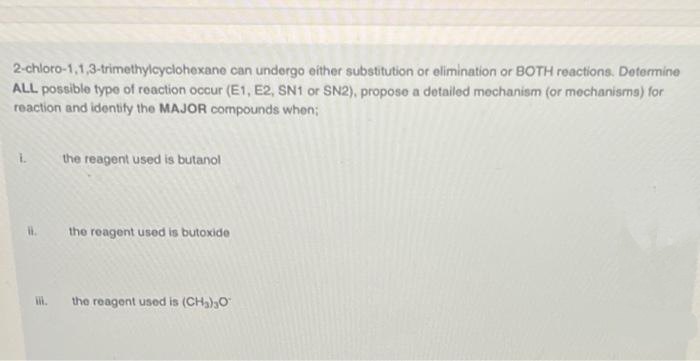2-chloro-1,1,3-trimethylcyclohexane can undergo either substitution or elimination or BOTH reactions. Determine ALL possible type of reaction occur (E1, E2, SN1 or SN2), propose a detailed mechanism (or mechanisms) for reaction and identify the MAJOR compounds when;
2-chloro-1,1,3-trimethylcyclohexane can undergo either substitution or elimination or BOTH reactions. Determine ALL possible type of reaction occur (E1, E2, SN1 or SN2), propose a detailed mechanism (or mechanisms) for reaction and identify the MAJOR compounds when;
Chapter30: Orbitals And Organic Chemistry: Pericyclic Reactions
Section30.SE: Something Extra
Problem 27AP
Related questions
Question

Transcribed Image Text:2-chloro-1,1,3-trimethylcyclohexane can undergo either substitution or elimination or BOTH reactions. Determine
ALL possible type of reaction occur (E1, E2, SN1 or SN2), propose a detailed mechanism (or mechanisms) for
reaction and identity the MAJOR compounds when;
the reagent used is butanol
he reagent used is butoxide
the reagent used is (CH),0
Expert Solution
This question has been solved!
Explore an expertly crafted, step-by-step solution for a thorough understanding of key concepts.
This is a popular solution!
Trending now
This is a popular solution!
Step by step
Solved in 2 steps with 1 images

Knowledge Booster
Learn more about
Need a deep-dive on the concept behind this application? Look no further. Learn more about this topic, chemistry and related others by exploring similar questions and additional content below.Recommended textbooks for you


Organic Chemistry
Chemistry
ISBN:
9781305580350
Author:
William H. Brown, Brent L. Iverson, Eric Anslyn, Christopher S. Foote
Publisher:
Cengage Learning


Organic Chemistry
Chemistry
ISBN:
9781305580350
Author:
William H. Brown, Brent L. Iverson, Eric Anslyn, Christopher S. Foote
Publisher:
Cengage Learning